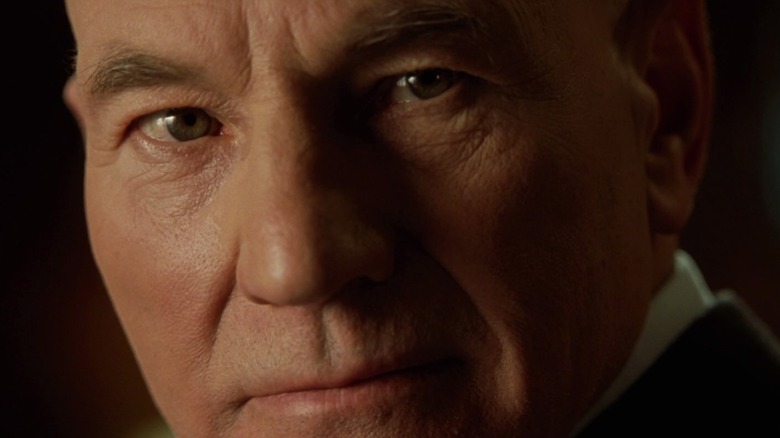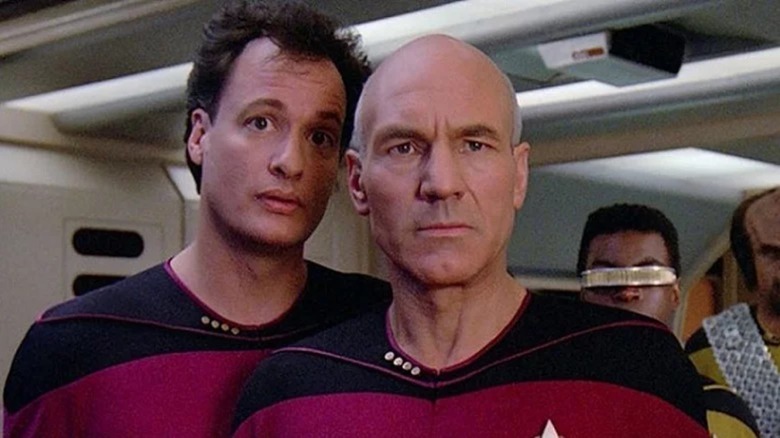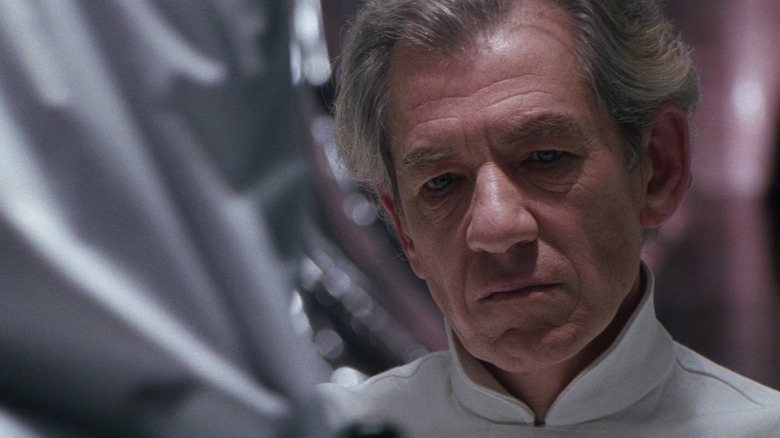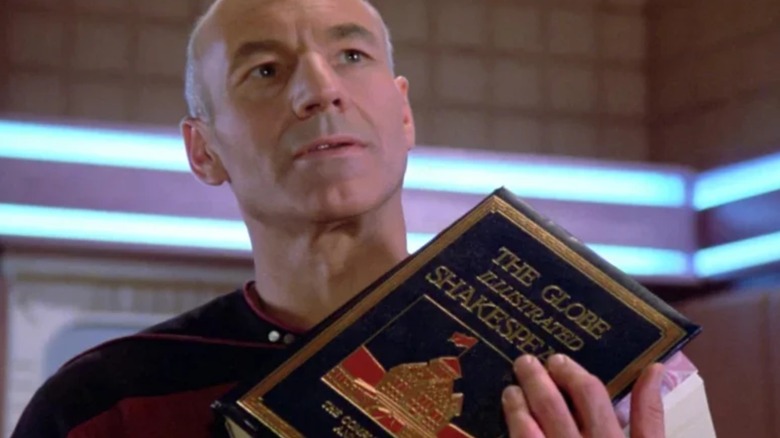A Legendary Actor Tried To Convince Patrick Stewart To Turn Down Star Trek
Sir Patrick Stewart's career has included plenty of high points, but the actor will always be most known as Captain Jean-Luc Picard. As the captain of the first crew to land their own TV show after the original run of "Star Trek," Stewart's character had plenty to prove to audiences worldwide. He did so admirably across an impressive run that ended up including seven seasons of "Star Trek: The Next Generation," three seasons of "Star Trek: Picard," and four feature films.
With decades of retrospect, Stewart's time on "Star Trek" seems like a no-brainer; the Shakespearean actor led a new crew with a cerebral thoughtfulness that countered Captain Kirk's heart-first leadership style, and he's still remembered by many fans as the best character to ever captain a Trek ship. Yet according to Stewart's new memoir, "Making It So," Stewart had reservations about taking the role in the first place — and they were exacerbated by his future best pal and co-star Sir Ian McKellen.
A great salary came with some strings
In his expansive, career-spanning memoir, Stewart wrote about the surreal experience of being offered "Star Trek: The Next Generation," a deal that offered a salary good enough that he asked for the number to be repeated to him when he first heard it. "Nope, I thought, I've never seen numbers like that in the vicinity of my name," Stewart wrote. There was, however, a catch. When Stewart was told he'd get a raise with each successive season, he asked for clarification, to which Stewart's agent, Steve Dontanville, "replied, somewhat irritably, 'Well, you will be contracted for six.'"
Stewart was shocked by the massive time commitment, and when he was reassured that it was an industry standard, he openly balked at the idea of foregoing any other career opportunities for this one. "He looked at me as if I had gone insane," Stewart wrote. "'There has been nothing more important or financially beneficial than this in your entire career to date,' he finally said." In the end, one cynical reassurance made things a bit easier; Dontanville believed that the show wouldn't last more than a season. "'I don't think anyone can replicate the success of the original 'Star Trek,'" Stewart recalled Dontanville saying. "You'll be lucky to make it to Thanksgiving, to be honest."
Sir Ian McKellen was not having it
According to Stewart, his actor friends all encouraged him to sign the contract, believing as Dontanville did that "Star Trek: The Next Generation" would fizzle out, but Stewart could make some good money in the meantime. This line of thought makes sense; in 1987, the last Trek show had been the relatively short-lived animated series over a decade earlier, and even the highly influential original series didn't last more than three seasons. "There was, however, a single dissenting voice," Stewart writes, and it was none other than the future Magneto to Stewart's Professor X. "Ian McKellen was not yet a close friend," Stewart detailed in the memoir, "but we had gotten to know each other casually in the Royal Shakespeare Company, where our tenures overlapped yet we somehow were never cast in the same show."
Stewart said that at the time he was still pretty shy around McKellen, whose work he thought "superior" to his own, but the pair ended up having lunch together when the contract signing process was still unfolding, and the actor was vehemently opposed. "When I told him I was going to sign the contract, he almost bodily prevented me from doing so," Stewart wrote, noting that McKellen said he had "too much important theater work to do" and shouldn't "throw that away to do TV." While Stewart said he trusted McKellen's counsel, he decided that he might only get one chance to lead an American TV show, so he had to make the most of it.
Stewart is now a legend of both stage and screen
Hilariously, Stewart wrote that McKellen "shook his head sadly, as if I were enlisting in the army, but, nevertheless, wished me good luck and gave me a big hug." Of course, it was Stewart who ended up being right in the end, a fact he says he loves to remind his friend of. "Star Trek: The Next Generation" not only lasted far longer than industry insiders expected, but it also won 18 primetime Emmys, two Hugos, a Peabody, and more.
The show continued and deepened the legacy of the optimistic, curious sci-fi series Gene Roddenberry dreamed of a few decades earlier, and when all was said and done, Stewart did get to return to the stage, earning praise for his turns in plays like "The Tempest" and "Macbeth" and appearing on stage into his seventies. "Star Trek: The Next Generation" also turned Stewart's Shakespearean training into a part of his character, and the actor never lost any sense of classic gravitas during his extended foray into television. Plus, in a great full-circle moment, Stewart would eventually go on to star opposite his old pal Sir Ian McKellen in a production of "Waiting For Godot." I hope he said "I told you so" every night before curtains.



